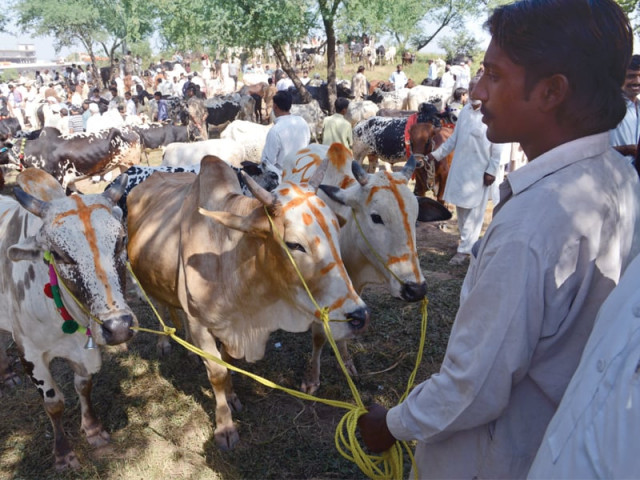With no floods, small livestock investors expect better returns
New investors enter the business of raising cattle with rural partners.

With all the positives, there are some downsides of the business, too. Investors say that this business has many risks including extreme weather like floods, extreme heat and improper vaccination. PHOTO: AFP
Small investors associated with the business of raising livestock in Sindh, especially new investors from Karachi, are expecting better returns on their investments this Eidul Azha – a sigh of relief after massive floods in 2010 and 2011 swept away thousands of cattle in the province.
The back-to-back devastating floods not only destroyed livelihood of rural farmers and livestock investors, they also discouraged investors from urban areas from making investment in rural livestock for Eidul Azha.

However, in the absence of major floods in 2012 and 2013, small investors from Karachi, who have entered the livestock market of rural Sindh, are now busy selling their animals in Karachi’s cattle market – the biggest cattle market in Pakistan.
Qurbanionline Co-founder Hasnain Raza said over the last two years many new investors had entered the business of raising young goats and cows in rural Sindh and Punjab and “are now selling them on Eidul Azha”.
Qurbanionline is Pakistan’s oldest and one of the busiest websites for the purchase of sacrificial animals and slaughter orders. The website is in its seventh year and its annual turnover has already crossed Rs16 million.

Owners of this business raise animals with the help of their rural partners in parts of Sindh and Punjab.
“I wanted to jump into this business four years ago, but the devastation caused by 2010 floods in which thousands of cattle died dampened investment prospects for investors like me,” said Ahmed Ali, a small investor from Karachi who purchased 50 young goats a year ago with an investment of Rs0.5 million.
Ali said he ventured into this business after seeing people in Karachi spending much more on sacrificial animals. Purchasing power in big cities had gone up many times in the last five years, he said.
Other investors say Sindh is suitable for raising young goats while Punjab is the preferred choice for breeding best quality cows and bulls.
People who work for this business purchase 50 to 100 young goats and cows and give them to partner investors living in rural Sindh and Punjab. Business owners are responsible for all vaccination of the animals while rural partners raise them for a year with an assurance that urban investors will buy all the grown-up animals before Eid.
This is how the urban investor gets a healthy animal at a very economical price ahead of Eid and the rural partner saves himself from the hassle of going to big cities to sell the animals.
Raza said this year they had already got over 4,000 orders for Eidul Azha, up from previous year’s 3,000 orders. Every year, over one-third of the orders come from Pakistanis living in the US, UK, Germany, Australia and other countries.
According to investors, price of a young goat is between Rs5,000 and Rs25,000 depending on the breed. Since small investors cannot take too much risk, they prefer to buy the breed that falls in the low price range of Rs5,000 to Rs7,000.
Apart from choosing the breed, the small investors also consider the size of investment. For instance, most small investors invest Rs0.5 to Rs1 million, but there are many, even the new ones, who invest up to Rs2.5 million.
For small investors of Karachi, Thatta is the most suitable district to raise young animals. They say they can easily travel to the nearby district and remain in constant contact with their partner investors.
However, with all the positives, there are some downsides of the business as well. Investors say this business has many risks including extreme weather like floods, extreme heat and improper vaccination, which may cause sudden death of the animals.
Published in The Express Tribune, October 16th, 2013.
Like Business on Facebook, follow @TribuneBiz on Twitter to stay informed and join in the conversation.



















COMMENTS
Comments are moderated and generally will be posted if they are on-topic and not abusive.
For more information, please see our Comments FAQ